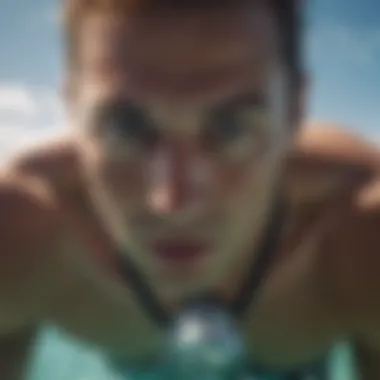Mastering Freediving Breathing Exercises: Techniques & Benefits


Intro
Freediving is an endeavor that not only captivates with its serenity but also tests one's physical and mental limits. At its core lies the crucial element of breathing. Mastering the art of breath has a profound impact on freediving performance and safety. This exploration into freediving breathing exercises will unveil the techniques that empower divers to control their air intake effectively, embrace relaxation even underwater, and cultivate both lung capacity and stamina. Rather than purely focusing on the act of diving, there is a larger emphasis on understanding and practicing breathing exercises that can enhance overall well-being as well. Through this guide, the nuanced techniques will become a vital part of any freediver’s training routine, whether they are just starting out or are seasoned in the practice.
Physiological Aspects of Breath Control
Understanding how the body responds to breathing in various underwater conditions is crucial. Breath control enables divers to expand their lung capacity and utilize oxygen efficiently. Freedivers experience hypoxia, which is a deficiency of oxygen, and hypercapnia, which is an excess of carbon dioxide. Learning how to control these conditions can greatly enhance the freediving experience.
Effective breath control helps to maintain composure, allowing for longer dives and better endurance. Techniques such as diaphragmatic breathing improve both lung function and anxiety management, making them fundamental for all levels of experience.
Significance of Relaxation
Relaxation in Twitter poses numerous benefits when underwater. Muscle tension can decrease oxygen demand; thus, calming oneself leads to a more efficient oxygen consumption. Relaxation techniques, therefore, become an essential aspect of freediving training. Practice in meditation or guided imagery can enhance focus and prepare one mentally for entering the water. I encourage new and experienced divers alike to integrate these mental strategies into their routine.
Breathing Techniques for Freediving
Diaphragmatic Breathing
This technique is the cornerstone of effective oxygen utilization. Rather than shallow breathing, intend to expand your diaphragm fully. With each inhale, aim to fill the abdomen and allow the lungs to do the extensive work. • Inhale deeply through the nose. • Feel the abdomen rise. • Exhale gently through the mouth. Practicing this path improves lung capacity and instills calmness.
Box Breathing
A structure to rhythm your breathing process, box breathing aids in mental clarity and deep relaxation. The principle revolves around four stages: inhale, hold, exhale, and hold again, each for a count of four. • Inhale for a count of four. • Hold your breath for a count of four. • Exhale for a count of four. • Hold your breath for a count of four. Repeat and gradually extend the counts as comfort increases.
Equalization Technique
A well-executed dive requires an understanding of equalization. Proper planning and mindfulness aid in managing pressure, important not only for comfort but for safety. Approach equalization with very steady and calculated breaths before descending to ensure effectiveness.
“To increase capacity and confidence during natural immersion, practice intentional breathing consistently across successive training sessions.”
Benefits of Freediving Breathing Exercises
The rewards of incorporating specific breathing exercises into your freediving practice extend beyond performance. Some of the key advantages include:
- Enhanced lung capacity.
- Greater breath-hold time.
- Improved psychological resilience.
- Stress management and overall relaxation in daily life.
- Enhanced enjoyment and exploratory freedom underwater.
Foreword to Freediving Breathing Exercises
Freediving relies heavily on controlled breathing. It is not just about extending breath-holding capacity; it is about the entire cycle of preparation, execution, and recovery. This fascination often leads individuals to explore the depths of their own abilities beneath the water. Consequently, breathing exercises play a significant role in optimizing one's performance.
Another aspect worth mentioning is the connection between refined breathing techniques and a decreased risk of in-water anxiety. For both beginners and seasoned divers, mastering the mechanics of breathing helps create a sense of comfort and familiarity with the environment.
Understanding Freediving
Freediving, also known as apnea diving, permits divers to immerse without breathing apparatus. This requires physicality and expertise; hence, extending breath-hold times can augment the experience underwater. New participants in freediving must grasp fundamental principles and proper training methods to maximize both safety and enjoyment. Learning effective breathing exercises can lead to an amplified sense of ease in the water.
Understanding the physiological responses related to freediving further enhances underwater experiences. Adaptation processes, such as increased tolerance to carbon dioxide stimuli, occur over time when breathing techniques are practiced diligently.
The Importance of Breathing Techniques
Breathing techniques are essential. They elevate every aspect of freediving training. Improving breath-holding involves more than just increasing lung capacity. It's also about lionger exhales, strengthening mental focus, and coordinating breath with underwater movements.
Here are some core reasons why breathing techniques matter:
- Efficiency: Better breath control results in improved oxygen use during dives.
- Relaxation: Mastering breath techniques encourages calmness, solidifying confidence underwater.
- Performance: Enhanced capacity and endurance bring more profound freediving experiences.


Learning these techniques ensures a proper foundation and manifests in remarkable personal development within the sport.
Physiology of Breathing
Understanding the physiology of breathing is essential for anyone involved in freediving. This knowledge not only lays the groundwork for effective breathing techniques but also enhances overall performance and safety in the water. Freedivers must grasp how their bodies utilize oxygen and expel carbon dioxide. This forms a fundamental part of breath control, an invaluable skill during any underwater endeavor. Exploring the human respiratory system, along with the effects of external pressures, offers rich insights into managing breath more efficiently.
How the Respiratory System Works
The respiratory system plays a crucial role in breathing efficiently, particularly for freedivers. The primary components include the nose, throat, trachea, bronchi, and lungs. Each part contributes to the overall function of inhalation and exhalation. When you breathe in, air travels through the nasal passages, where it is warmed and filtered. Next, it descends into the trachea and branches into the bronchi, eventually filling the alveoli in the lungs. Here is where oxygen from the air enters the blood, while carbon dioxide is expelled.
Understanding this process is pertinent for freedivers. It highlights how effective breathing techniques can optimize the oxygen intake. Freedivers can perform better if they know how to maximize their lung capacity and use their breath effectively. This knowledge aids in increased endurance during extended dives and facilitates a smoother life underwater.
Oxygen and Carbon Dioxide Exchange
The exchange between oxygen and carbon dioxide occurs predominantly within the alveoli, where each breath has a significant impact on performance. Oxygen is vital for cellular respiring, supporting bodily functions, and sustaining energy levels. During activities such as freediving, the efficiency of this exchange directly influences performance metrics.
- Oxygen is required for energy production in cells. This must be managed well, especially at depths where access to breathable oxygen becomes limited.
- Carbon Dioxide, on the other hand, serves as a stimulant for breathing. Elevated CO2 levels trigger the urge to exhale, signaling the body when to come up for air.
Understanding the dynamics betweens these gases can enable freedivers to better stretch their limits while recognizing individual thresholds.
Effects of Underwater Pressure on Breathing
When submerged in water, one must comprehend how external pressure affects breathing. As divers descend, pressure increases, making it more challenging to expand the lungs during inhalation. This compressive force can reduce lung capacity significantly, altering breathing patterns.
In addition to physical constrictions, this subject requires careful attention while training for integration of adapted techniques to counter these challenges.
- Increas chamber decreases lung function, calling for systematic breathing exercises that improve adaptability.
- Training under different pressure conditions helps develop physiological responses, fostering longer durations underwater without distress.
Awareness of these elements concerning pressure can improve effectiveness in training and execution of techniques.
An understanding of how the respiratory system functions, along with knowledge of gas exchange and pressure impacts, is fundamental for optimizing freediving performance.
Fundamental Breathing Exercises for Freediving
Understanding fundamental breathing exercises is crucial for anyone involved in freediving. These exercises serve as the foundation for developing efficiency and control in one’s breath. This section will outline specific techniques and their benefits, all tailored for those who crave the underwater experience but may lack the necessary breath control.
Diaphragmatic Breathing
Diaphragmatic breathing, often referred to as abdominal or belly breathing, is a technique where the diaphragm is engaged to pull air deep into the lungs.Breathing in deeply allows for maximum oxygen intake, particularly beneficial in the context of freediving.
Importance of Diaphragmatic Breathing
It ensures that the lungs are being filled effectively rather than relying only on chest expansion, which can lead to shallow breaths. For freedivers, this depth of breathing promotes:
- Greater oxygen stores: More oxygen means better performance underwater.
- Increased relaxation: Activating the diaphragm stimulates the parasympathetic nervous system.
- Lower anxiety levels: Controlled breaths reduce feelings of panic when submerged.
In summary, practicing diaphragmatic breathing leads to essential physiological improvements for freedivers.
Pursed-Lip Breathing
Pursed-lip breathing is another method utilized to enhance breath control. It involves inhaling through the nose and exhaling through pursed lips, kind of like blowing out a candle.
Relevance to Freediving
- Extended exhalation: An extended exhale allows for more effective removal of carbon dioxide, which helps improve gas exchange.
- Controlled breaths: This technique effectively moderates the pace of breathing, particularly during moments of exertion underwater.
- Reduce feelings of breathlessness: Regulating exhalation can lead to a enhanced sense of calm in challenging situations.


Integrating pursed-lip breathing into training routines creates significant advantages for breaching performance deficits.
Box Breathing Technique
Box breathing, or square breathing, is a technique involving equal parts inhalation, hold, exhalation, and hold. Each component lasts for the same duration, creating a
Advanced Techniques
Advanced techniques in freediving breathing exercises play a crucial role in refining abilities and enhancing overall performance in the water. These methods go beyond basic breathing techniques and target specific areas like breath-holding, lung capacity, and endurance. As divers seek to improve their time underwater, incorporating advanced techniques can make a substantial difference. By focusing on skills like static and dynamic apnea, as well as conditioning lung behavior with Functional Residual Capacity (FRC) breathing exercises, divers can move towards mastering their respiratory control under pressure and maximizing their potential.
Static Apnea Training
Static apnea training is a key exercise that helps divers develop the ability to hold their breath for prolonged periods while remaining still. This technique requires minimal movement, allowing the diver to focus exclusively on their breathing. The goal is to maximize breath-holding time, which can lead to improved mental focus and the ability to handle stress during freediving.
To practice, one can start with a series of warm-up breaths. After that, take a deep inhale and submerge while keeping still. Timing yourself while counting seconds is helpful, as it creates focus. A few tips to keep in mind include:
- Stay Relaxed: Tension will consume more oxygen; relaxed muscles hold less tension.
- Breathing Before: Ensure to perform a proper breathing routine prior to each attempt.
- Safety First: Always practice this with a buddy, especially if venturing into deeper waters.
Dynamic Apnea Drills
Dynamic apnea drills involve swimming horizontally while holding your breath. This training mimics real freediving situations where breath control is necessary over movement. The emphasis is not only on distance but also on maintaining a smooth, rhythmic stroke to conserve energy and oxygen.
By practicing these drills, divers build physical strength, increase buoyancy awareness, and hone mental fortitude. Exercises can vary, including varies types such as:
- No Fins: Rely on arms to move through water.
- With Fins: Employing fins promotes speed and efficiency.
- Obstacle Courses: This can layout different paths that challenge adaptability underwater.
Strategic physical exertion during dynamic apnea reinforces breath control and challenges divers to maintain relaxation while in action. This creates a blend between effort and precision.
FRC (Functional Residual Capacity) Breathing
FRC breathing focuses on the volume of air remaining in the lungs after exhalation. Training this can maximize lung efficiency, lengthening duration for breath-hold tasks. Diving educators stress its importance for managing respiratory limits in various depths.
Prerequisites include understanding exhalation. Perform long, slow breaths, focusing on slow extending of exhale duration. Starting at a comfortable volume, gradually exhaust the inhale to train the adjustability of breathing.
Benefits of practicing FRC breathing are numerous. Some key aspects include:
- Increased Lung Capacity: Boosts support during deep dives.
- Greater CO2 Tolerance: Helps manage buildup during breath-holding.
- Improved Recovery: Excellent tool in reducing buildup efficiency.
By committing to these advanced techniques, freedivers will not only enhance their skill level but also contribute positively to their health and safety in aquatic environments. Correct execution lays a solid foundation toward mastering the sport.
Benefits of Freediving Breathing Exercises
Freediving is not simply about plunging into deep waters; it involves a mastery of breath control. Breathing exercises play a pivotal role in enhancing not only performance under the sea but also personal well-being. When divers commit to these techniques, the impact can be profound, influencing not just their time underwater but overall health. Let us advance into the specific benefits that these exercises can offer.
Enhanced Oxygen Efficiency
One of the primary advantages of practicing freediving breathing exercises is the improvement in oxygen efficiency. By honing techniques such as diaphragmatic breathing, individuals increase their capacity for utilizing oxygen. This increment often translates into longer dive times and deeper descents.
- Maximizing Oxygen Intake: We're enabling the body to take in more oxygen with each breath through targeted exercises. Learning to utilize the diaphragm positions divers to absorb air effectively.
- Utilizing Exhaled Air: Managing exhalation techniques can aid in preventing unnecessary oxygen loss, ensuring that what’s taken in is effectively used.
Improved oxygen efficiency is not purely about performance; it translates into an enhanced feeling of vitality while on land as well.
Greater Relaxation and Stress Reduction
The environment of deep water can induce stress and anxiety. Hence, mastering breathing mechanisms can assist significantly in fostering relaxation. Freediving breathing exercises do not merely focus on physical benefits but profoundly affect mental state, which is vital in extreme sports.


- Inducing a Relaxed State: Properly executed breath control helps in activating the parasympathetic nervous system. This enhances feelings of calm, making it easier to manage apprehensions linked to depths.
- Mitigating Anxiety Responses: Closing off panic involves knowing how to control one’s breathing, thereby immediate stress responses can be significantly dulled.
The transition into relaxation becomes a necessary step for any serious freediver. Here, breathing techniques serve as foundational tools for all who seek to spend time beneath the waves.
Improved Mental Clarity and Focus
Progressing in freediving demands more than just adequate breath control; it requires mental acuity. Engaging in specific breathing methods cultivates an enhanced state of mental clarity, which bearings real-world dividends for adventurers.
- Engaging in Mindfulness: Through exercises like box breathing, divers learn to anchor their focus. Less distraction leads to better performance, which is crucial while engaging in deep dives.
- Boosting Cognitive Functioning: Increased oxygen levels directly correlate to sharpness of mind.Thus, a conscious breathing regime allows freedivers to think clearly even in dynamic water environments.
In summary, the integration of breathing drills into freediving practice does more than aid diving performance; it enhances life quality by boosting clarity, promoting relaxation, and ensuring effective use of oxygen. Such exercises define the diving journey and promote wellness beyond oceanic challenges.
Overcoming Common Challenges
Overcoming common challenges in freediving is essential for maximizing performance and ensuring a safe experience. Each diver, whether a novice or an expert, will confront situational stress or mental barriers during their journey. Awareness and management of these challenges can greatly influence not only the achievement of personal goals but also the enjoyment that comes from being underwater.
Dealing with Water Anxiety
Water anxiety is a frequent issue for those new to freediving or those who might not have sufficient experience in aquatic environments. Anxiety manifests due to various factors, including fear of drowning, lack of experience, or discomfort in underwater conditions. It is crucial to acknowledge these feelings and approach them with tactics geared towards building confidence.
One effective approach is gradual exposure. Start with shallow water drills, progressively increasing depth as comfort builds. Practicing visualization techniques can also help. Picture yourself diving calmly, controlling your breath effectively. Regular training sessions not only provide familiarity but also enhance a diver’s skills and the ability to manage emotions when submerged. Ambience plays a role; choosing calm settings for initiation along with a batch of well-trained peers can help ease the dive into practice.
Building Breath-Holding Confidence
For many, breath-holding presents a significant hurdle. This concern might arise due to personal limitations, previous experiences, or inadequate training. To build confidence, divers can adopt structured training regimens. Implementing exercises gradually strengthens the body’s tolerance to low oxygen levels, which is gradually beneficial in maintaining composure during extended dives.
Starting with short held breaths in a controlled environment is advisable. Use a timer to keep progress, allowing gaps in-between attempts. It is beneficial to note the feeling of calmness that develops over time, contrasting it with initial discomforts. Additionally, partnering with a coach during these sessions can provide critical feedback, encourage resilience, and ensure safety aspects are prioritized.
Integrating Breathing Exercises into Training
The need for merging breathing exercises into freediving training cannot be overstressed. Doing so ensures consistent enhancement of performance metrics, even amid rising distractions that occur underwater. Practical methods exist to achieve consistency without overwhelming oneself.
- Regular Time Blocks: Allocate dedicated time within training routines specifically for breathing exercises.
- Focus on Form: Prioritize quality over quantity; proper technique yields better results.
- Vary Techniques: Mix between diaphragmatic and box breathing to stave off monotony while honing adaptability.
- Use Technology: Devices for tracking breathing progress can highlight areas that need improvement and help keep motivation levels up.
In closing, addressing these challenges diminishes barriers that prevent diving practice. When they are methodically overcome, not only is freediving enriched, but personal growth and skills enhancement become an intrinsic part of the journey.
The End
In the context of freediving, effective breathing techniques are not merely supplementary; they are critical. The conclusion draws a connection between various exercises discussed throughout the article and their fundamental role in enhancing overall performance. Essential concepts such as relaxation, breath control, and physiological adaptability underpin each technique. Reiterating these key points helps reinforce the importance of understanding the body’s responses to breath-holding and underwater pressure.
Freediving moves beyond a physical endeavor. It demands mental composure and emotional stability. Freediving breathing exercises facilitate not only the physical capabilities but also mental clarity. These practices address common worries that divers encounter, contributing to greater focus during dives.
A crucial benefit worth noting is that improved breath-holding strategies lead to longer underwater durations and deeper dives. Another significant benefit is the capacity to maintain calmness despite chaotic aquatic surroundings. Diving enthusiasts should regard these breathing strategies as invaluable tools that elevate their liberated aquatic experiences.
"Enhancing one’s breath is akin to enhancing one’s overall connection with the ocean."
Utilizing these exercises can empower divers, forging a more seamless integration with the underwater realm. Additionally, challenges such as water anxiety and breath accountability can be diminished through practice. The discipline gathered can translate into proficiency and poise, crafting a holistic freediving experience.
Summarizing Key Points
To recapitulate, several powerful techniques have been examined. These include:
- Diaphragmatic breathing, which cultivates a deeper capacity for oxygen intake.
- Pursed-lip breathing, which helps regulate airflow and maintains steady breaths.
- Box breathing, contributing to a rhythmical breathing pattern conducive to relaxation.
- Apnea training methods, which directly enhance breath-holding capability through various drills.
Integrating these methods can vastly improve performance metrics such as depth attained and time spent underwater. They also pivotally assist in managing stress levels before and during dives.
Encouragement for Continuous Practice
Engagement into a regular practice of these breathing exercises is encouraging. Habituating one's body to effectively control air intake leads to long-term improvements. Perhaps beginning with basic techniques before progressing to more advanced practices can create a customized training regimen.
Continuous learning and simulation create depth in skill matched with competence. Consider timing sessions and measuring progress to note development over time. Diverse practice locations can also be beneficial, stripping away monotony. An enriching practice period builds confidence, fostering both mindfulness within the water and beyond.
Freediving is a journey, and persistent attention to breath will significantly deepen the connection to one’s freediving ability. Valid concern alongside dedication thrives inherent excitement for underwater exploration. Future successes within this treasured aquatic experience do not only rest on depth perspectives of water but the breadth of control one incurs with each breath.







